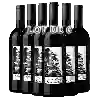
Winery FontvielhCuvee Brumes D Or Monbazillac
This wine generally goes well with
Details and technical informations about Winery Fontvielh's Cuvee Brumes D Or Monbazillac.
Discover the grape variety: Tinta Barroca
Most certainly Portuguese, more precisely in the Douro region where it is very present. It can be found in Spain, Portugal, South Africa, ... almost unknown in France, registered in the Official Catalogue of A2 list varieties.
Last vintages of this wine
The best vintages of Cuvee Brumes D Or Monbazillac from Winery Fontvielh are 2011
Informations about the Winery Fontvielh
The Winery Fontvielh is one of of the world's greatest estates. It offers 1 wines for sale in the of Guyenne to come and discover on site or to buy online.
The wine region of Guyenne
45 kilometres east of Bordeaux, Blasimon is perched on a hillside overlooking the Gamage, a tributary of the Dordogne. Its hilly sites and its calm make it an ideal place to relax. A Village of medieval origin, its origin reflects the traditional organization of the bastides. The city conceals one of the Romanesque jewels of the Gironde, the Benedictine abbey of the X-XIII th centuries.
The wine region of South West
The South-West is a large territorial area of France, comprising the administrative regions of Aquitaine, Limousin and Midi-Pyrénées. However, as far as the French wine area is concerned, the South-West region is a little less clear-cut, as it excludes Bordeaux - a wine region so productive that it is de facto an area in its own right. The wines of the South West have a Long and eventful history. The local rivers play a key role, as they were the main trade routes to bring wines from traditional regions such as Cahors, Bergerac, Buzet and Gaillac to their markets.
The word of the wine: Oenology
The science of the oenologist, which is essentially concerned with the elaboration and maturation of wines.




